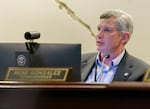
FILE - Commissioner Rene Gonzalez during a City Council meeting in Portland, Ore., May 31, 2023. Gonzalez has proposed an alternative to Mayor Ted Wheeler's plan to restrict public camping that gives authority to the executive branch.
Kristyna Wentz-Graff / OPB
Portland Commissioner Rene Gonzalez has proposed a divisive alternative to a public camping ban proposal heading to City Council this month.
The current proposal, drafted by Mayor Ted Wheeler, gives Portland City Council the authority to draft and approve a policy limiting where and how people can rest outside. Gonzalez, who is running for mayor this year, wants this authority to lie solely with the mayor. His proposal, first reported by Willamette Week, also proposes harsher criminal sanctions for people living unsheltered if federal and state laws change.
And he might have the support needed on City Council to see this through.
The discussion comes as laws around public camping hit the national stage. Next week, the U.S. Supreme Court will hear arguments in the Grants Pass v. Johnson case, in which the Southern Oregon city is challenging a previous appeals court ruling that bars cities from enforcing laws that punish people for sleeping outside if no other shelter is available. The Supreme Court isn’t expected to issue a ruling for several months.
Related: What led to Grants Pass v. Johnson to the US Supreme Court
Gonzalez says that moving the decision to the mayor’s office will allow Portland to move more swiftly to adapt the city’s camping policy if the Supreme Court rules in favor of Grants Pass. This could also affect a state law enshrining the appeals court protections that Grants Pass is challenging.
“What I’m considering is whether we adopt a model that would delegate to the [city’s] executive side the ability to promulgate rules on camping so that those rules could be updated efficiently based on the changing legal landscape,” Gonzalez said in late March, when he had not yet proposed an alternative to Wheeler’s camping ordinance.
Wheeler pitched a revamped camping proposal two weeks ago, after an initial city-approved camping ban was hit with a lawsuit from people experiencing homelessness who called the policy too restrictive. The updated policy slims down the rule being challenged in court by only limiting the types of activities people can engage in while camping on public property.
Under this policy, those who violate these rules could be fined up to $100 or sentenced to up to seven days in jail.
Gonzalez’s counterproposal contains the same fine, but extends the jail time to 30 days.
And it goes further: If the U.S. Supreme Court and state Legislature overturn laws that restrict cities from penalizing public camping, it directs the city to impose fines of up to $500 or up to six months in jail.
The policy also adds a section directing the mayor’s office to be responsible for adopting these rules. Under the city’s new form of government, which will go into effect in January, the mayor will no longer serve as a legislator and instead work closely with a new city administrator to oversee city operations.
Gonzalez calls his proposal the “Gresham model,” as it is similar to Gresham’s public camping policy. However, Gresham’s rule only allows the city to impose civil penalties on people who violate the policy, instead of the criminal charges Gonzalez is proposing.
“Aligning with our neighbor cities is also another major advantage that values collaboration and coordination in confronting what is truly a regional crisis,” Gonzalez said in a statement emailed to OPB Wednesday.
Related: Portland Mayor Wheeler unveils new public camping ban policy
City Council was scheduled to hold its first vote on Wheeler’s proposal this week. After hearing pushback from Gonzalez, the discussion has been postponed until April 24.
The proposal has the cautious support of Commissioner Dan Ryan. According to T.J. McHugh, Ryan’s chief of staff, Ryan is interested in adopting a rule that is similar to Gresham’s policy, since the city boundaries blend into each other.
“Between 140th [Avenue] and 180th [Avenue], you don’t know if it’s Gresham or Portland,” McHugh said. “It makes sense to have a continuous policy in place.”
McHugh said that Ryan would prefer all city commissioners agree on a camping policy before next week, instead of forcing a contentious council debate.
Commissioner Carmen Rubio and Mayor Wheeler have panned Gonzalez’s proposal. In a statement provided to OPB, Rubio said she believed Wheeler’s camping policy had struck the right balance and was frustrated by Gonzalez’s eleventh-hour proposal.
“It criminalizes homelessness — without an opportunity to choose a path toward treatment — and that’s not what Portlanders want,” said Rubio, who is also running for mayor. “Portlanders want accountability with compassion — in the form of real addiction and mental health treatment choices.”
In early April, Wheeler said that council members should be responsible for crafting this policy.
“I don’t think we should dodge the question by pushing it off to an administrator,” he told OPB at the time. “My attitude is, let’s have the people who are accountable to the public, our elected officials, make these decisions in public.” If approved, it would go into effect immediately, giving Wheeler authority to dictate a camping policy.
Related: Rene Gonzelez' first year: On the offensive, but not always on target
Gonzalez’s office says that, unless commissioners come to an agreement on his plan, Gonzalez’s proposal will most likely be introduced as an amendment to Wheeler’s policy next week. Gonzalez will need three votes on council. While he has Ryan’s support, it’s not yet clear where Commissioner Mingus Mapps, another mayoral candidate, stands on the idea.
According to Mapps spokesperson Andrew Baker, Mapps still needs to thoroughly review Gonzalez’s proposal before making a decision.
